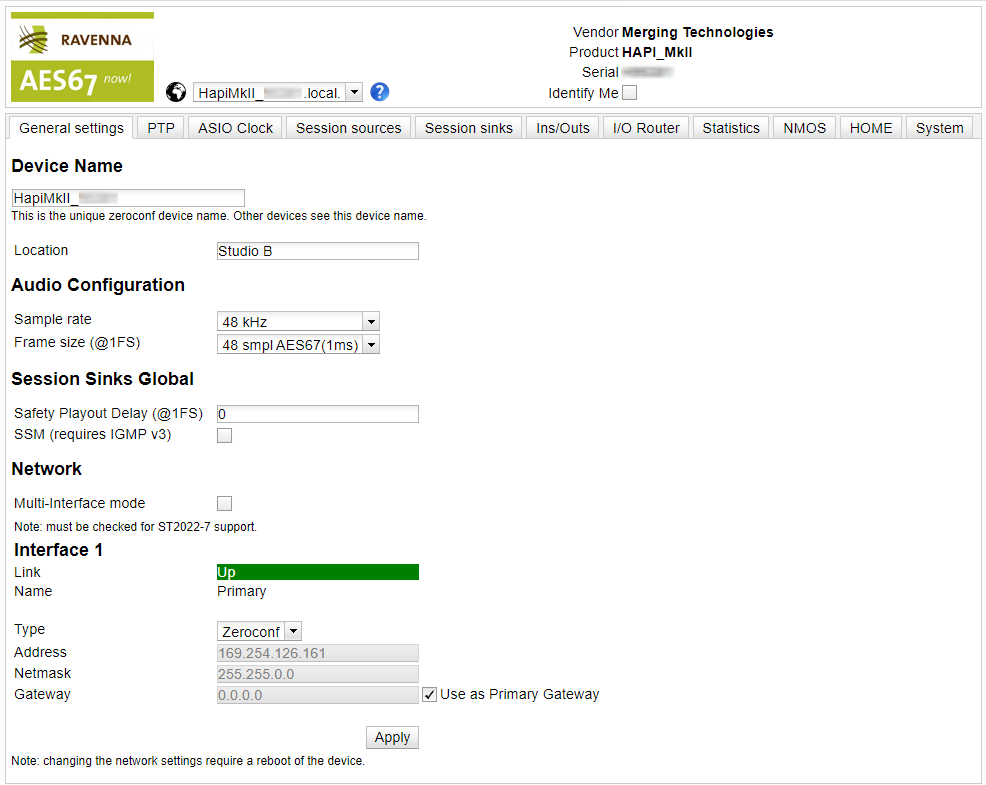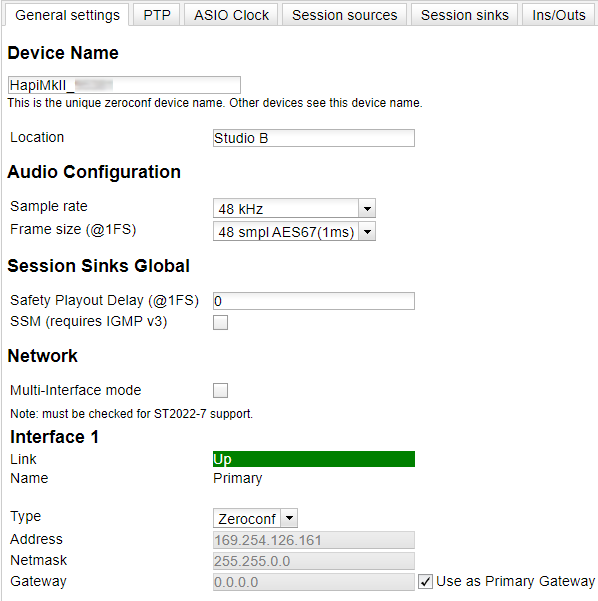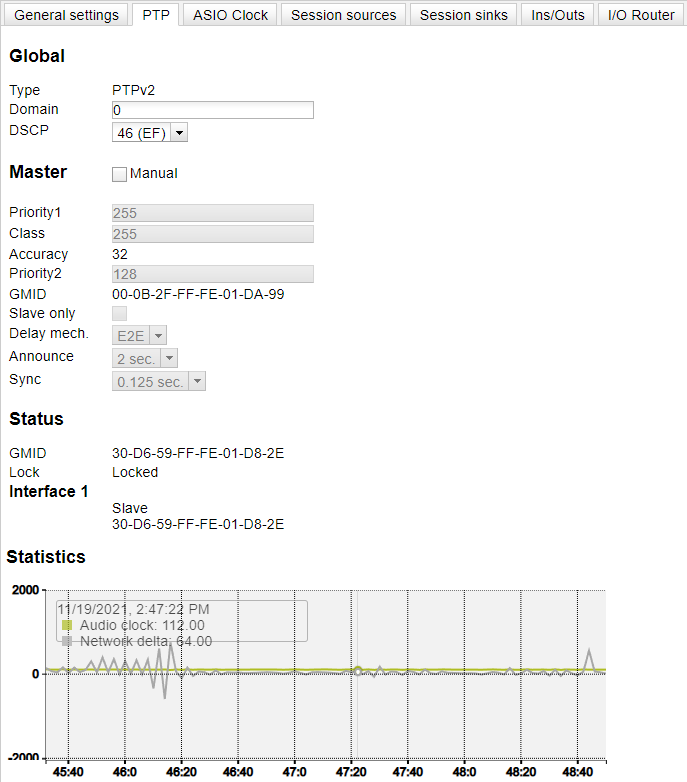- Firmware_1.5.
...
- 7.56838.Anubis
- Firmware_1.5.
...
- 7.
...
- 56838.Hapimkii
- Firmware_3.12.6.
...
- 56838.Hapi
- Firmware_3.12.
...
- 6.56838.Horus
| Table of Contents |
|---|
How to access the Advanced pages
- With the device IP address :
- Horus/Hapi/NADAC/Anubis
In your browser, enter the device IP address followed by /advanced/index.html
E.g: 169.254.80.179/advanced/index.html - VAD (ASIO, CoreAudio, ALSA)
In your browser, enter the device IP address followed by :9090
E.g: 169.254.80.179:9090
- Horus/Hapi/NADAC/Anubis
- Through MT Discovery :
Right click on your device and select Open Advanced (Hardware devices : Horus, Hapi,...) or Open (Software devices : MassCore, ASIO, Alsa,....) - Through ANEMAN :
Right click on your device and select Web Services : Advanced (or RAVENNA if Advanced is not available)
GENERAL SETTINGS
Device Name
- This is the unique zeroconf device name. Other devices see this device name.
Reboot is not required for the change to apply. Equivalent to device Setup menu > Network > Device Name (Horus/Hapi)
Merging recommends to not exceed 32 characters (The device name is translated to UTF8, which support max 63 bytes) - Location : information text (64 characters max)
Audio Configuration
- Sample Rate : current sample rate (44100-48000- 88200-96000-176400-192000-352800-384000)
- Frame size (@1Fs) :current frame size (64 - AES67/48 - 32 -16 - 12 -6).
Note that available frame size values may not be available or differ according to the device and/or firmware.
Session Sinks Global
- Safety Playout Delay (@1Fs) : additional playout delay. The value is described at 1Fs (44.1-48 kHz) in samples.
For example, if the value is 10, the additional playout delay will be 20 at 2Fs (88.2-96 kHz), 40 at 4FS (176.4-192 kHz),... SSM (requires IGMP v3) : Source-Specific Multicast.
If you activate this option, make sure your network switch supports and is configured for IGMP V3.
Network
- Multi-Interface mode : Activate / deactivate ST2022-7 mode - only applicable to Merging devices supporting such feature.
Interface 1-2
Note : depending on the device and firmware, only Interface 1 might be available.
- Link : status
- Name : information only - can't be modified
- Type : defines the type of IP V4 address used (Zeroconf - DHCP - Static)
- Address - NetMask - Gateway : only available if Type is set to Static.
Reboot is required for changes to apply.
PTP
Global
PTP Domain : allow to define a specific PTP domain, usually when several PTP masters are required in the same network (default value for Merging devices and programs is 0).
Expand title PTP Domain support is available since the following versions MassCore : Pyramix v11.1.5 / Ovation v7.1.5
Ravenna ASIO : v12.0
ALSA : v1.0
CoreAudio / Virtual Audio Device : v2.0.37746
Horus - Hapi - NADAC : firmware v3.9.2
Anubis : firmware v1.0- DSCP : PTP DSCP (46-EF : PTP AES67 / 48-CS6 : PTP RAVENNA / 56-CS7)
Master
To modify the PTP setting, you must first tick the "Manual" checkbox.
- Priority 1 is the main priority value.
- Class : Device class. This value should not be modified.
- Accuracy : cant be modified.
- Priority 2 is only used if the other parameters do not allow to elect a PTP master.
- GMID : Current GrandMasterID (PTP Master)
Slave only : forces the Merging device to always be PTP slave.
- Delay Mech.: PTP Profile related - E2E or P2P (Note: MassCore does not use PTP Delay Mechanism)
Announce : PTP Profile related - PTP announcement interval (1 - 2 - 4 - 8 -16 seconds)
Sync : PTP Profile related (0.0625 - 0.125 - 0.25 - 0.5 seconds)
Status
- ASIOClock Host : Master ASIO Clock device IP address (only displayed for Merging RAVENNA ASIO device).
- GMID : Current GrandMasterID (PTP Master)
- Lock : shows if the device is locked to PTP (Locked -Locking - Unlocked)
- Interface 1-2 :
Note : depending on the device and firmware, only Interface 1 might be available.
PTP status :
Master : Device is Master
Slave : Device is Slave
Listening : The interface is not used for synchronization. Statistics (since firmware 3.9.3)
The graph is only active for slave devices. Not available for ASIO device.
Green curve : shows the regulated device delta against the current Master PTP clock.
Grey curve : shows the network delta against the current Master PTP clock, before the device regulation algorithm.
| Tip |
|---|
| PTP Priority value : 1 is the highest priority, 255 the lowest one. Merging devices are by default using Priority 127 when set as PTP Master and 255 when PTP slave |
...
APPENDIX
Session Sources error codes
-99: Unable to add the Stream : The maximum number of streams has been reached, or if the device is Merging ASIO, it is not started.
Horus-Hapi : The max number of streams is 32 in, 32 out - the number of ASIO Clock.
Anubis - Hapi MKII - ZMAN: The max number of streams is 64 in, 64 out - the number of ASIO Clock.
-100: Channels mapped to unexisting input : The requested input channels are not available. This might happen with modules that have a different number of channels depending of the sampling rate.
-101: Channels must be mapped contiguously : The channel mapping must be contiguous, 1-2-3-4....and not 1-3-7-8.
-102: All channels must be mapped : All the channels from the selected IO must be used (usually 8 channels)
-103: IO not available : The requested IO is no longer available. E.g. AD card removed or not available at the current sampling rate / audio data format (DXD/DSD)
-104: Address collision : The Address is already used by another source.
-105: Address undefined : The Address is missing or not properly described.
-106: Invalid Codec : Codec is missing, or not compatible with the selected IO
-107: Channels mapped to unexisting output : The requested output channels are not available. This might happen with modules that have a different number of channels depending of the sampling rate.
-109: IO with mixed audio data format : The Codec / Data format must be the same between the different streams connected to the requested module.
Session Sinks error codes
-1: Internal error : unknown error
-10: Unknown RTSP error : error in the RTSP.
-19: Sample rate does not match : Source sampling rate does not match with the device sampling rate.
-20: Channel count does not match : Source number of channels does not match with the Sink number of channels. Alternatively to set the same number of channels, you may use the Relaxed Check - accept source with lower channel count option.
-21: SDP: clock domain or GMID does not match : PTP domain described in the Source SDP does not match with the device PTP domain.
-22: SDP: payload does not match : Payload type described in the Source SDP does not match with the Sink payload type.
-23: SDP: connection (c=) missing : Multicast Destination IP is not described in the Source SDP
-30: Channel map collision : The IO / Channels are already connected to another source.
-93: HTTP: retrieving SDP error : unable to retrieve the Source SDP (via HTTP)
-94: RTSP: unicast source unavailable (NADAC ASIO/CoreAudio's unicast sources are not supported by Horus/Hapi) AutoUnicast mode : The current Sink did not provide the required port to the Source. Please note that AutoUnicast is only compatible with Merging Technologies devices.
-95: SDP: unicast address doesn't match : Unicast mode. The unicast address in the SDP does not match the receiver one.
-96: RTSP: retrieving SDP error (firewall?) : unable to retrieve the Source SDP (via RTSP)
-97: SDP: parsing error : SDP not properly described, please check its formatting.
-98: Unable to add the Stream : The maximum number of streams has been reached, or if the device is Merging ASIO, it is not started. The max number of streams is 32 in, 32 out - the number of ASIO Clock.
-99: SDP: Source not properly configured : Source not properly described in the SDP.
-100: Channels must be mapped contiguously : The channel mapping must be contiguous, 1-2-3-4....and not 1-3-7-8.
-101: All channels must be mapped : All the channels from the selected IO must be used (usually 8 channels)
-102: IO not available : The requested IO is no longer available. E.g. DA card removed or not available at the current sampling rate / audio data format (DXD/DSD)
-103: Channel mapped to unexisting output : The requested output channels are not available. This might happen with modules that have a different number of channels depending of the sampling rate. In the device routing menu, please also make sure that the required IO is set to Ravenna (Horus/Hapi) or Unrouted (Zman, Anubis, Hapi MKII).
-104: Invalid Codec : Codec is missing, or not compatible with the selected IO
-105: Channel map not supported : Number of channels / channel mapping is not supported by the selected IO. Depending on the device / IO selected, only channel count set to 8 is supported.
-106: Channels mapped to an already used input : The selected IO is already connected to another source.
-107: Channels mapped to unexisting input : The requested input channels are not available. This might happen with modules that have a different number of channels depending of the sampling rate. In the device routing menu, please also make sure that the required IO is set to Ravenna (Horus/Hapi) or Unrouted (Zman, Anubis, Hapi MKII).
-109: SDP: port number not supported : The RTP port does not follow the standard and is refused ; it is below 1024 or above 32766 (multicast only).
-110: MDNS_support_not_available_error: MDNS (bonjour) not available. SDP must be provided manually.
Incoming/outgoing RTP range
- Addresses : unicast + multicast range [225..239].x.x.[0..254]
- Multicast Ports range: 1024 to 65535 (since Firmware Horus/Hapi 3.12.5, ZMAN based products (Anubis, HapiMkII, ZOEM) 1.5.2 and Software products VAD 3.2.7, MAD 2.2.8, MassCore 14.1 )
Unicast Ports range: 1024 to 32767 - Odd RTP ports are supported since :
Horus/Hapi firmware 3.11.2.52601
ZMAN based products (Anubis, HapiMkII, ZOEM) firmware 1.4.4.52601
Merging Audio Device v2.2.2.52601
Merging RAVENNA AES67 VAD v3.2.2.52601
MassCore currently not supported
External Links
https://en.wikipedia.org/wiki/Session_Description_Protocol
https://standards.ieee.org/standard/1588-2008.html
https://en.wikipedia.org/wiki/Precision_Time_Protocol


